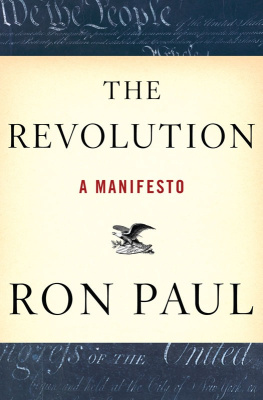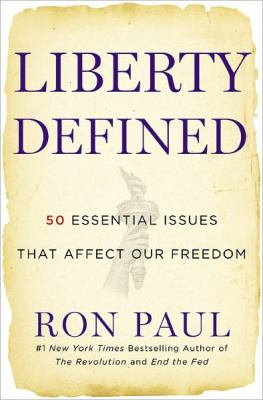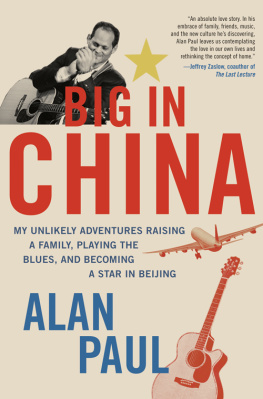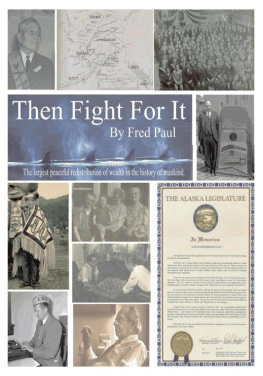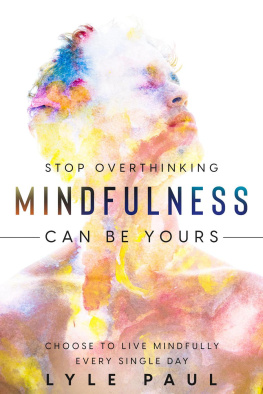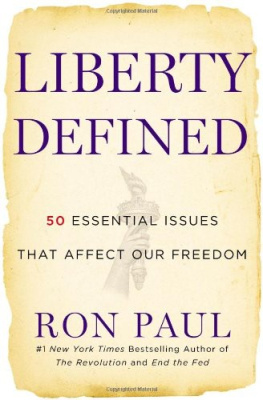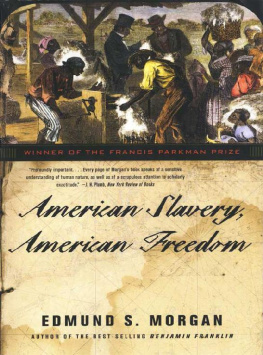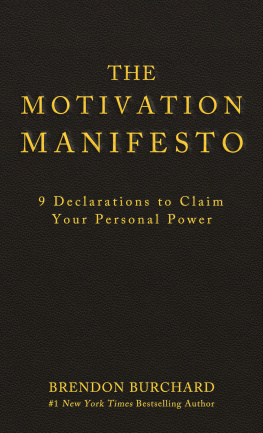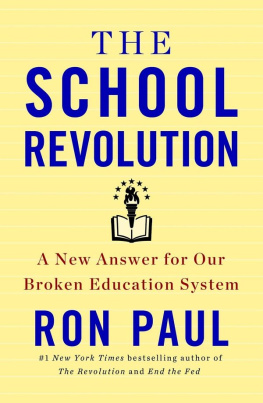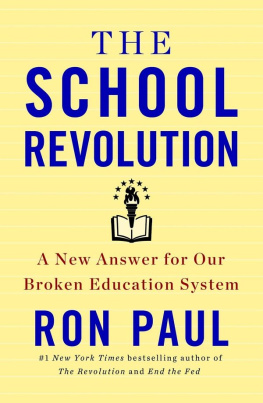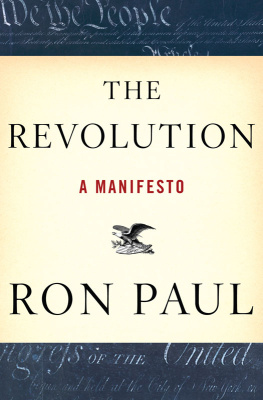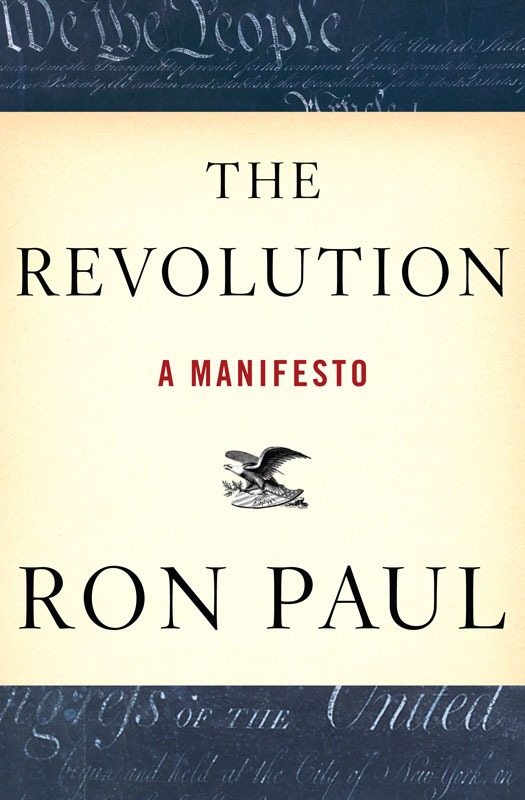Copyright 2008 by Ron Paul
All rights reserved. Except as permitted under the U.S. Copyright Act of 1976, no part of this publication may be reproduced, distributed, or transmitted in any form or by any means, or stored in a database or retrieval system, without the prior written permission of the publisher.
Grand Central Publishing
Hachette Book Group USA
237 Park Avenue
New York, NY 10017
Visit our Web site at www.HachetteBookGroupUSA.com.
First eBook Edition: April 2008
Grand Central Publishing is a division of Hachette Book Group USA, Inc.
The Grand Central Publishing name and logo is a trademark of Hachette Book Group USA, Inc.
ISBN: 978-0-446-54035-3
To my supporters:
I have never been more humbled and honored than by your selfless devotion to freedom and the Constitution.
The American Revolutionaries did the impossible.
So can we.
E very election cycle we are treated to candidates who promise us change, and 2008 has been no different. But in the American political lexicon, change always means more of the same: more government, more looting of Americans, more inflation, more police-state measures, more unnecessary war, and more centralization of power.
Real change would mean something like the opposite of those things. It might even involve following our Constitution. And thats the one option Americans are never permitted to hear.
Today we are living in a fantasy world. Our entitlement programs are insolvent: in a couple of decades they will face a shortfall amounting to tens of trillions of dollars. Meanwhile, the housing bubble is bursting and our dollar is collapsing. We are borrowing billions from China every day in order to prop up a bloated overseas presence that weakens our national defense and stirs up hostility against us. And all our political class can come up with is more of the same.
One columnist puts it like this: we are borrowing from Europe in order to defend Europe, we are borrowing from Japan in order to keep cheap oil flowing to Japan, and we are borrowing from Arab regimes in order to install democracy in Iraq. Is it really isolationism to find something wrong with this picture?
With national bankruptcy looming, politicians from both parties continue to make multitrillion-dollar promises of free goods from the government, and hardly a soul wonders if we can still afford to have troops inthis is not a misprint130 countries around the world. All of this is going to come to an end sooner or later, because financial reality is going to make itself felt in very uncomfortable ways. But instead of thinking about what this means for how we conduct our foreign and domestic affairs, our chattering classes seem incapable of speaking in anything but the emptiest platitudes, when they can be bothered to address serious issues at all. Fundamental questions like this, and countless others besides, are off the table in our mainstream media, which focuses our attention on trivialities and phony debates as we march toward oblivion.
This is the deadening consensus that crosses party lines, that dominates our major media, and that is strangling the liberty and prosperity that were once the birthright of Americans. Dissenters who tell their fellow citizens what is really going on are subject to smear campaigns that, like clockwork, are aimed at the political heretic. Truth is treason in the empire of lies.
There is an alternative to national bankruptcy, a bigger police state, trillion-dollar wars, and a government that draws ever more parasitically on the productive energies of the American people. Its called freedom. But as weve learned through hard experience, we are not going to hear a word in its favor if our political and media establishments have anything to say about it.
If we want to live in a free society, we need to break free from these artificial limitations on free debate and start asking serious questions once again. I am happy that my campaign for the presidency has finally raised some of them. But this is a long-term project that will persist far into the future. These ideas cannot be allowed to die, buried beneath the mind-numbing chorus of empty slogans and inanities that constitute official political discourse in America.
That is why I wrote this book.
The False Choices of American Politics
E very election season America is presented with a series of false choices. Should we launch preemptive wars against this country or that one? Should every American neighborhood live under this social policy or that one? Should a third of our income be taken away by an income tax or a national sales tax? The shared assumptions behind these questions, on the other hand, are never cast in doubt, or even raised. And anyone who wants to ask different questions or who suggests that the questions as framed exclude attractive, humane alternatives, is ipso facto excluded from mainstream discussion.
And so every four years we are treated to the same tired, predictable routine: two candidates with few disagreements on fundamentals pretend that they represent dramatically different philosophies of government.
The supposedly conservative candidate tells us about waste in government, and ticks off $10 million in frivolous pork-barrel projects that outrage himthe inevitable bridge-to-nowhere project, or a study of the effects of celery consumption on arresting memory lossin order to elicit laughter and applause from partisan audiences. All right, so thats 0.00045 percent of the federal budget dealt with; what does he propose to do with the other 99.99955 percent, in order to return our country to living within its means? Not a word. Those same three or four silly programs will be brought up all campaign long, and thats all well hear about where the candidate stands on spending. But conservatives are told that they must support these candidates, and so they do, hoping for the best. And nothing changes.
Even war doesnt really distinguish the two parties from each other. Hillary Clinton and John Kerry voted for the Iraq war. With the exceptions of Dennis Kucinich and Mike Gravel, even the Democrats who postured as antiwar candidates for the 2008 primary elections are not especially opposed to needless wars. They typically have a laundry list of other military interventions they would support, none of which make any sense, would make our country any safer, or would do a thing to return our country to fiscal sanity. But liberals are told that they must support these candidates, and so they do, hoping for the best. And nothing changes.
A substantial portion of the conservative movement has become a parody of its former self. Once home to distinguished intellectuals and men of letters, it now tolerates and even encourages anti-intellectualism and jingoism that would have embarrassed earlier generations of conservative thinkers. There are still some good and decent conservative leaders to be found, and a portion of the grass roots has remained uncorrupted by the transformation of conservatism into just another Big Government movement. But Big Government at home and abroad seems to suit many conservative spokesmen just fine. Once in a while they will latch on to phony but conservative-sounding causes like tax reformalmost always a shell game in which taxes are shuffled around rather than actually reduced overallin order to pacify the conservative base, but thats about it.
When Republicans won a massive off-year election victory in 1994, neoconservative Bill Kristol immediately urged them not to do anything drastic but to wait until the Republicans took the White House in 1996. Well, the Republicans didnt take the White House in 1996, so nothing ever got done. Instead, the Republican leadership urged these freshman congressmen to focus on a toothless, soporific agenda called the Contract with America that was boldly touted as a major overhaul of the federal government. Nothing could have been further from the truth. The Contract with America was typical of what I have just described: no fundamental questions are ever raised, and even supposedly radical and revolutionary measures turn out to be modest and safe. In fact, the Brookings Institution in effect said that if

